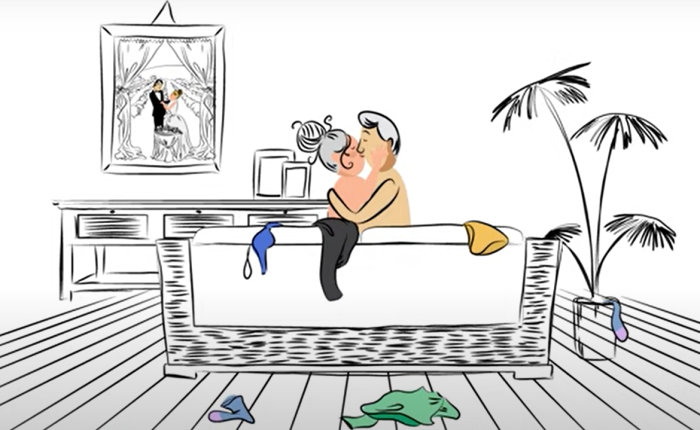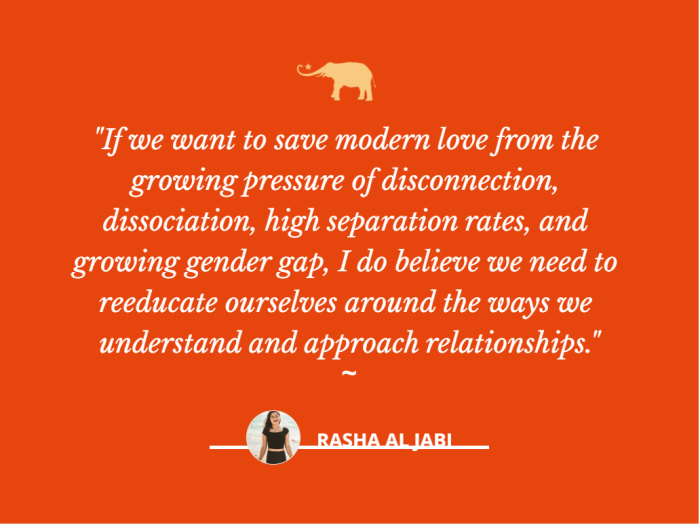“Sometimes, when we seek the gaze of another, it isn’t our partner we are turning away from, but the person we have become. We are not looking for another lover so much as another version of ourselves.” ~ Esther Perel
~
For as long as I could remember, my perception of love was built on romanticism—the idea that our purpose is to seek “the one and only” person who, once identified, will eradicate all of our loneliness, longing, and, what I like to call, soul homelessness.
In our modern culture of self-actualization, self-realization, self-fulfillment, and self-liberation—at least from a Western standpoint—we sometimes glorify being a hopeless romantic as a positive attribute and see it as the sole way to find that everlasting love affair that we were raised to believe was the truest and supreme expression of what love is.
Whereas in the past, marriage and love were considered two separate entities, wherein the former was a simple economic contract that was established to guarantee us safety, predictability, stability, dependability, and the continuation of our offsprings, it is no longer the case in the era of modern love.
Those of us who are blessed to have an education, a job, and a stable source of income no longer need to seek a partner for financial reasons—or the majority of us women don’t. So our understanding and reasons for seeking love have shifted greatly into a romantic notion where we have merged love, commitment, sex, and even marriage into the same category.
Over the past century, we have been indoctrinated to embrace those romantic ideals about love through Shakespearean novels and play scripts, cinema, and storytelling that placed the lover on a high pedestal and taught us to seek commitment and sex as the ultimate end goal of every successful love story, with the promise of a happily ever after.
Urban Dictionary’s definition of a hopeless romantic is “someone who is in love with the idea of being loved and loving back. They are not made for today’s standards, as they believe in the little things about true love, fairy tales, and chivalry, and truly believe that there is only one person out there for them. They get attached quickly, but they are genuinely the best boy/girlfriend you could have. They are loving, caring people who give their 100 percent, expecting a full return.”
Can we pause for a moment to reflect on how many red flags this definition entails? Hello, unhealthy attachment, trauma bond, childhood trauma, and idealistic expectations that do not (and will likely never) measure up to the one and true reality: that we live in a world dominated by flawed human beings (as we are ourselves), and that no one person can be everything we wish or want from them.
As the famous quote by the New York-based Psychotherapist, Esther Perel goes: “We expect one person to give us what once an entire village used to provide, and we live twice as long.”
In my recent years up until the last person I was seeing a few months back, I have been guilty of getting attached too quickly and being enamored with the potential of who someone could be instead of who someone reveals themselves to be in actuality.
This becomes especially problematic when our habitual inclination is to gaslight ourselves and to ignore all the red flags that we probably recognize from all our previous failed romances in an attempt to weave ourselves into this new love story, whilst being hopeful that this time, things will be better, different, and that we will finally be happy.
In my mid-20s, while I was going through a rough breakup, I remember asking one of my close friends at the time whether she believed that love was the only ingredient for a relationship to work, and feeling deeply wounded and insulted when she didn’t validate my beliefs at the time.
I now see how my earlier understanding of love was built on not only cultural indoctrination and Hollywood films but was a reflection of the scarcity and love deprivation I grew up in, which resulted in the idea that love can heal all my longing to be seen, understood, and validated and that it would finally provide me with the sense of belonging I so felt disconnected from.
In this video, the English-Swiss Philosopher, Essayist, and Founder of The School of Life, Alan de Botton, identifies six areas within a romantic template that shape our understanding and perception of love:
>> Marriage
>> Love and sex
>> End of loneliness
>> Feelings
>> No practicalities
>> Accepting
He argues how our expectations and predictable outcomes in each of these six areas can often lead to catastrophic results.
For example, within the area of loneliness, he says that no matter how wonderful and admirable our partner is, they can never be everything we expect from them and, therefore, be the ultimate salvation to all our loneliness, not because of some unique flaw but because that’s simply how human nature is: flawed, wavering, and unpredictable.
Rather, de Botton challenges us to reeducate ourselves in a new approach to love that, albeit unfamiliar and less romantic in the sense that we’re used to, but can spare us hours of bitter arguments, resentment, and ending in legal court over separations that could have been saved by learning how to communicate and flexing our compassion and tolerance muscles toward our partner.
He reframes it as the “Classical Template,” which includes the following ingredients:
>> Love and sex
>> Money talk
>> Flaws
>> Loneliness
>> Communication
>> Practicalities
My 20-something-year-old self would have probably scoffed at the boring ingredients included in this list.
For example, I see myself questioning areas around money and arguing that if two people truly loved each other, then they’re supposed to somehow “figure out” how to solve their financial issues by making their relationship work instead of being honest about their own expectations around money.
I see myself questioning someone’s loyalty, love, and how well they know me if they expected me to communicate my hurt feelings rather than to miraculously read my mind, body language, and passive-aggressive demeanor.
I still find myself occasionally shutting down whenever feelings of loneliness and isolation creep in whilst I am exploring the potential of a new relationship or navigating being with someone new.
Sometimes, this manifests in dissociating and checking out mid-conversations, or pushing someone away rather than leaning into the relationship when I feel vulnerable, unwhole, or exposed. Then, the imposter syndrome in me gets louder and aggrandizes itself by listing all the reasons why getting into this relationship was a stupid idea, or why I didn’t deserve to be in one in the first place.
But if being in relationships—both the ones built on trauma bonds and the somewhat healthier versions—taught me one thing, it would be the tremendous potential of healing and education that can be offered within the confines of a relational dynamic.
It is often easy to say that we’re never going to enter a relationship unless we’ve done enough work on ourselves, which isn’t a bad idea. But I don’t believe there’s ever an end goal to healing because we’re constantly evolving and growing, and one of the ways we can grow is by learning how to relate with other people—whether romantically or platonically.
But if we want to save modern love from the growing pressure of disconnection, dissociation, high separation rates, and growing gender gap, I do believe we need to reeducate ourselves around the ways we understand and approach relationships.
And that is not to say that romance, playfulness, or hot sex should not be essential ingredients in that new redefinition. It is simply to argue that they may never be the sole components, if happily ever after—at least for the short while—is what we’re seeking.
Or, in the words of de Botton, we need to shift our attitudes toward a more hopeful, post-romantic future for love—if we want it to survive.


 Share on bsky
Share on bsky






Read 9 comments and reply